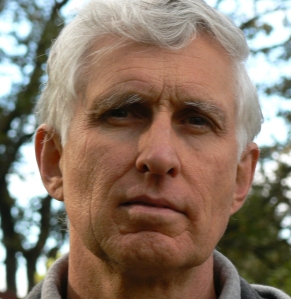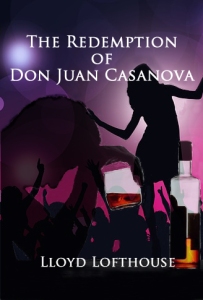Today I get the pleasure of interviewing the author of the new book, The Redemption of Don Juan Casanova, Lloyd Lofthouse. Mr. Lofthouse, let me start by saying thank you for your service to this country. It is always an honor to meet a veteran such as yourself. In the format of my previous interview, my comments are in Green and Mr. Lofthouse will be Blue.
Let’s dive right in shall we? Your latest work, tell us a little about it.
I’ve always enjoyed reading murder mysteries. For instance, I’m a fan of Dick Francis (I’ve read most of his work), Dan Brown, Lee Child, James Patterson, John Grisham, David Baldacci, James Lee Burke (my favorite), Patricia Cornwell, Richard North Patterson, Dashiell Hammett, and Tony Hillerman (I’ve read all of his novels and even the last one written by his daughter after his death), and this is my short list.
When I decided to write my own murder mystery, “The Redemption of Don Juan Casanova,” I borrowed from my experience as a maître d’ in a large night club in the early 1980s. The Aphrodisiac Academy is modeled after the Red Onion (the chain went out of business in the 1990s, because a few bartenders were caught by undercover police selling cocaine in the club—I was gone by then but borrowed that event and added it to the novel). But when I was still working there, I caught a newly hired bouncer in the bathroom off the lobby being paid off by a drug dealer. I reported what I saw to the club’s general manager and I never saw that bouncer again. For a few days after that, I expected to get shot down when I left my shift after midnight and drove home.
I also used my own mother and older brother to help develop the main character’s mother and older brother. That doesn’t mean they are exactly like my mother and older brother. In fact, the pimp we meet early in the story was modeled after a real pimp who did drive out of Beverly Hills to our club to avoid his enemies, and that pimp, who was not murdered, was confronted by the club’s head bouncer when he was caught abusing one of his girls in the Red Onion’s parking lot. I was there when our head bouncer, who had a black belt, knocked him down and warned him to never bring his girls to the club again.
What brought you to decide to write your first book? Describe the feeling the first time you held a printed copy of your own work.
Forty years slipped by from the moment I decided I wanted to write my first book length manuscript—that still isn’t published—and holding the paperback of my twelfth manuscript and first novel, My Splendid Concubine, a work that took nearly nine years to research, write and complete.
What caused me to want to be a writer was listening to Ray Bradbury in 1968 when he came to speak at the college I was attending with financial help from the Vietnam G.I. Bill. It was my first year of college and two years later I had completed that first manuscript that found an agent and an interested publisher, who took a year to make the decision to go with another writer, due to a budget that only allowed for one new writer a year.
The first time I held that paperback for My Splendid Concubine, if I had any feelings, it was mentally holding my breath as I waited for readers I didn’t know, to enjoy the story. That was almost seven years ago and now the novel has more than 100 reviews on Amazon—a few negative and many positive—and more reviews on other sites. The novel has also picked up a number of literary awards through the years.
Surprisingly, even after having published four books, I still feel the same way every time one comes out—that sensation of waiting and mentally holding my breath to discover if someone I don’t know enjoyed reading the story.
Where does your inspiration come from for your books?
The inspiration for the stories I write come from many places: for instance, my imagination and the experiences I’ve had through this journey we call life. That journey also includes the thousands of books I’ve read and films I’ve seen.
What do you think makes a good story?
I think what makes for a good story is the collision of characters dealing with what life throws at them, and how they handle the conflicts—internal and external—that arrive like unexpected mental and physical tsunamis and earthquakes.
What has writing taught you about yourself?
Sticking with writing and facing hundreds and maybe thousands of rejections for more than forty years taught me that if you want a chance to achieve your goals and dreams you cannot give up. Once you stop, you’ve lost. You might stumble once in a while and even fall down but you have to get back up and continue the journey that you started. I’ve been falling and picking myself up for decades in my long journey. I hope I never arrive at that final destination. If you fall in love with writing, that probably helps.
Can you tell us a little about your journey to publication? Did you seek out agents or did you go straight to publishing houses?
My journey to publication was a long one, and during that journey I had more than one agent and had more than one manuscript considered seriously but always in the end rejected. I don’t know exactly how many rejections there have been. For instance, back in the 1980s, one of the early agents managed to get the manuscript for my second novel, Running with the Enemy (Dec. 2013), in front of a senior editor at Random House, who rejected the novel after writing that he enjoyed the story, but no one was publishing stories about the Vietnam war anymore, because the market was glutted and readers weren’t buying. That manuscript sat on a shelf for about 25 years before I dusted it off, revised it, had it edited and indie published it. Now that I’ve had some success as an indie author I no longer look for agents or submit my work to publishers.
I see that you were a teacher for 30 years, do you think that has helped you in your writing? How?
Yes, I think being a teacher did help me as a writer. For most of those thirty years I taught English literature and grammar and that helped me discover more about plot, character, conflict, theme and improve my own grammar and mechanics skills. I think that teaching something is the best way to learn it.
In addition, for seven years I was the advisor teacher of a high school journalism class that produced an award winning student generated high school newspaper. I think that working with hundreds of high school journalists and reading their work also sharpened my eye for what grabs the attention of most readers.
Any advice that you would give to fellow writers?
The only advice I want to offer is to never give up if writing is your passion, and do all you can to improve your skills. It’s nice to have talent but talent isn’t enough for most of us when it comes to writing. Writing is a craft and a craft can be learned. That’s why, after Ray Bradbury motivated me to change my goals in college, I changed my major from architecture/urban planning to journalism for the BA, attended workshops out of UCLA’s writing extension program for seven years, and eventually earned an MFA in writing part time through two other universities over a period of several more years. And read. Read a lot. Writers should be readers who have experienced as much life as possible because through life we discover, learn and grow.
Thank you much for your time Mr. Lofthouse.
You are welcome, and thank you for having me on your Blog as a guest author.
Here you can find a list of links where you can connect with Lloyd Lofthouse. Stay tuned because tomorrow I will have a review of his latest book, “The Redemption of Don Juan Casanova”.
http://www.amazon.com/Redemption-Don-Juan-Casanova-ebook/dp/B00TR9Q0Q8/ref=asap_bc?ie=UTF8


Pingback: Redemption of Don Juan Casanova By Lloyd Lofthouse
Thanks for taking part in the tour. I’m looking forward to reading your review tomorrow.
LikeLike
Thank you for taking part in Redemption’s book blog tour. I read your About Me page and discovered your grandfather was a former Marine. Semper Fi.
Have you written about his life—when he served, where he served? I sense a story there. :o)
LikeLike